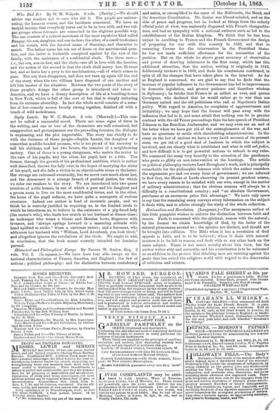advise our readers not to care who did it. The
people are uninter- esting, the humour coarse, and the incidents unnataraL We have an insipid heroine that everybody turns out to be in love with, and two vul- gar groups whose fortunes are connected in the slightest possible way. The one consists of a retired merchant of the most repulsive kind called Bungay, his son, daughter, and son-in-law; the other, of a small tradesman and his sisters, with the farcical name of Simminy, and character to match. The father turns his son out of doors on the matrimonial ques- tion, and the latter is forthwith conspired against by the rest of the family, with the assistance of a confidential derk. The three mea- l. e., the son, son-in-law, and the clerk—are all in love with the heroine, and the notion of the second is that the clerk shall marry her, ill-treat her, and so leave her a prey to his machinations,—all of which comes to pass. The son then disappears, and does not tarn up again till the end of the story, when the two villians have disposed of one another and left him master of the situation. Between the two parts of the story of these people's doings the other group is introduced and taken to America, and we have a dreary description of life at a boarding-house in New York, which is full of the sort of fun that is simply irritating from its extreme absurdity. In fact the whole novel consists of a num- ber of low-comedy scenes loosely strung together, finished off with a touch of wild melodrama.






























 Previous page
Previous page